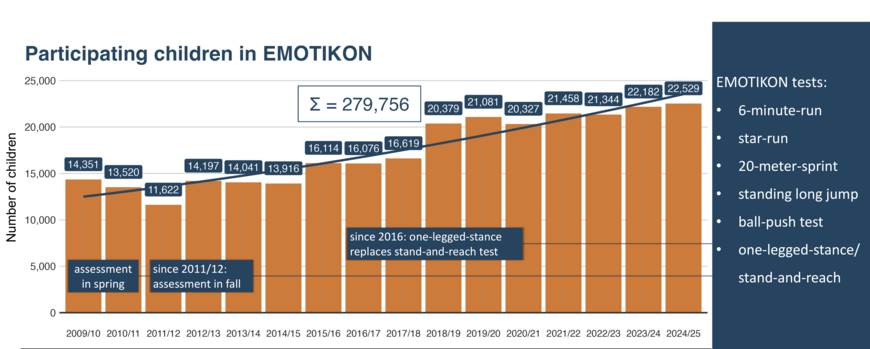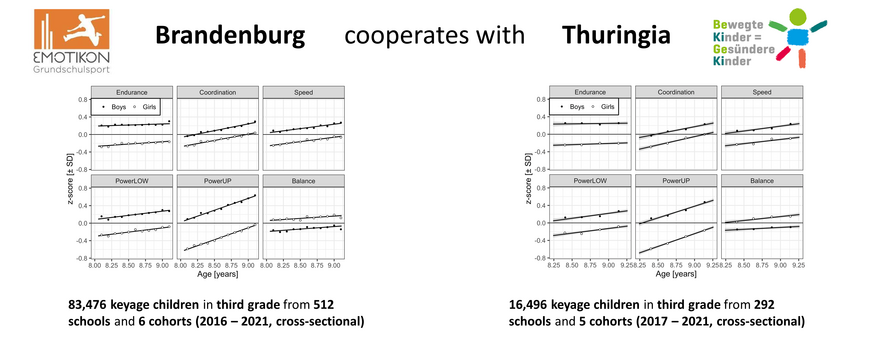Project News
New paper out (April 2025)
Our new paper examines the relationship between school social structure and physical fitness of primary school children in Brandenburg. The school-specific social index provided by the Ministry of Education, Youth and Sports (MBJS) was used as an indicator of social structure. Schools with higher social status exhibit better physical fitness, greater pandemic-related losses in coordination and speed, as well as a more positive post-pandemic coordination development. Results highlight the need for support in schools with a lower social status.
New paper out (April 2025) – in cooperation with the Thuringian project 'Bewegte Kinder, gesündere Kinder' (BeKiGeKi)
Our new paper examines the effects of body constitution, age, sex, and the COVID-19 pandemic on the physical fitness of primary school children from Thuringia. Similar to findings from the EMOTIKON project in Brandenburg, the COVID-19 pandemic was associated with small declines in several fitness components. The relationship between body constitution and fitness test performance differs depending on the physical fitness component. Age and sex effects reported in Brandenburg were replicated.
New paper out (2024)
Our new report examines effects of assessment time within the school year on physical fitness. Some physical fitness components improve beyond age effects throughout the school year, presumably reflecting the benefit of physical activity in physical education and other settings. Effects of assessment time are relevant in performance-based grading or norm-based selection of children.
Prof. Dr. Reinhold Kliegl wins the Supervision Award "Die Goldene Hand der asp" (The Golden Hand of asp)
At its 56th annual conference on May 9, 2024, the Arbeitsgemeinschaft für Sportpsychologie (Association for Sport Psychology, asp) awarded the supervision prize "Die Goldene Hand der asp". The goal of the supervision prize is to recognize and highlight excellent supervision of doctoral students and to raise awareness of the standards of high-quality supervision. Excellent supervision includes not only methodological and substantive support but also appreciation of the doctoral students and a trusting collaboration. The awardee, Prof. Dr. Reinhold Kliegl, was nominated by his doctoral students from the EMOTIKON project.
Brandenburg cooperates with Thüringen and Mecklenburg-Vorpommern
BeKiGeKi ("Bewegte Kinder = gesündere Kinder", "Active children = healthier children") in the Federal State of Thürigen, Germany, and BewegungsCHECK in the Federal State of Mecklenburg-Vorpommern, Germany, are the sister projects of EMOTIKON (Brandenburg). All three projects annually assess the physical fitness of third-graders using the same six fitness tests.
Researchers from the Universities of Potsdam, Erfurt, and Rostock investigate social and regional differences in physical fitness (socio-economic status, child poverty, urban-rural differences), and the effects of the Covid pandemic and body constitution on the physical fitness of children.
You can find our research on ResearchGate.
Physical fitness is a powerful marker of health in children and adolescents. Previous research has established positive associations between physical fitness, psychological and emotional traits, cognitive function (e.g., attentional capacity), and academic achievements (e.g., grade in mathematics) in youth. Furthermore, there is evidence indicating that low levels of physical fitness during childhood and adolescence are associated with an increased risk for overweight/obesity and cardiovascular diseases.
The negative effects of increased sedentariness, declines in physical fitness and concomitant increases in time spent with media intensified public, scientific and political discussions. Various professional organisations (e.g., Conference of the Ministers of Education and Cultural Affairs, Germany; German Olympic Sports Confederation) recommended to continuously monitor and assess youth physical fitness. In accordance with these recommendations, the Federal State of Brandenburg decided to establish the project EMOTIKON which is a German acronym for the “Assessment of physical fitness in third-graders in the Federal State of Brandenburg to continuously evaluate physical education and promote physical activity and fitness”. EMOTIKON is a collaborative project between the Ministry of Education, Youth, and Sport, Federal State of Brandenburg, the University of Potsdam, and the State Sports Association, Federal State of Brandenburg.
The primary purpose of EMOTIKON is to assess and evaluate physical fitness of all third-graders in a state-wide effort and to deduce recommendations for the promotion of physical activity and fitness. The test battery is easy to administer and includes six different tests for the assessment of cardiorespiratory endurance (i.e., 6 min run test), coordination (i.e., star run test), speed (i.e., 20-m linear sprint test), balance (i.e., one legged balance test), a proxy of lower limbs muscle power (i.e., standing long jump test), and a proxy of upper limbs muscle power (i.e., ball push test).
You can find publications from the EMOTIKON project here:
EMOTIKON project reports:
Read more about EMOTIKON in the project reports from years 2022 and 2023.


